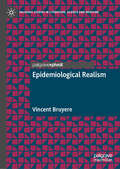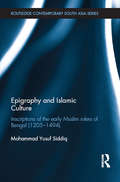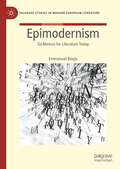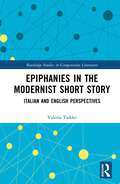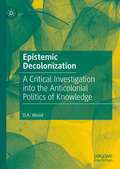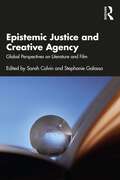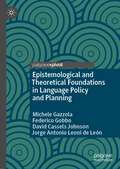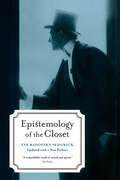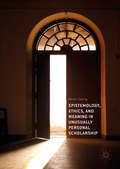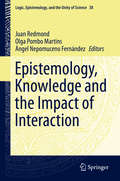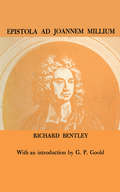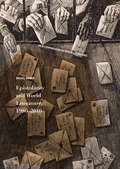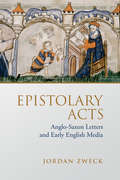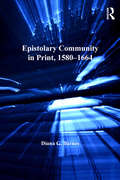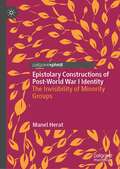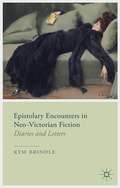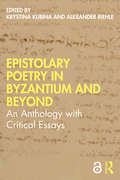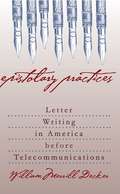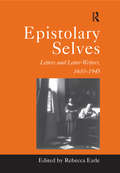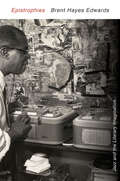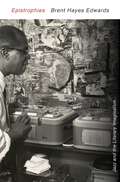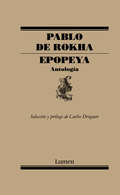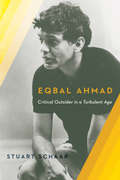- Table View
- List View
Epidemiological Realism (Palgrave Studies in Literature, Science and Medicine)
by Vincent BruyereThis book examines what it means to live in an epidemiological reality, exploring the worldbuilding properties of epidemiology through the lens of critical theory, literary analysis, and visual culture. Whether we want it or not, we live in a world made of statistical correlations, risk factors, and social determinants of health, animal reservoirs and spillovers, containment strategies and curves to be flattened, prophylactic measures, and syndromic surveillance systems detecting in real-time potential outbreaks. This book uses a series of vignettes to show that we have lived in a version of that reality for quite some time now, even before the formalization of epidemiological tools and concepts at the beginning of the twentieth century.
Epigram, Art, and Devotion in Later Byzantium
by Ivan DrpićThis book explores the nexus of art, personal piety, and self-representation in the last centuries of Byzantium. Spanning the period from around 1100 to around 1450, it focuses upon the evidence of verse inscriptions, or epigrams, on works of art. Epigrammatic poetry, Professor Drpić argues, constitutes a critical - if largely neglected - source for reconstructing aesthetic and socio-cultural discourses that informed the making, use, and perception of art in the Byzantine world. Bringing together art-historical and literary modes of analysis, the book examines epigrams and other related texts alongside an array of objects, including icons, reliquaries, ecclesiastical textiles, mosaics, and entire church buildings. By attending to such diverse topics as devotional self-fashioning, the aesthetics of adornment, sacred giving, and the erotics of the icon, this study offers a penetrating and highly original account of Byzantine art and its place in Byzantine society and religious life.
Epigraphy and Islamic Culture: Inscriptions of the Early Muslim Rulers of Bengal (1205-1494) (Routledge Contemporary South Asia Series)
by Mohammad Yusuf SiddiqArchitectural inscriptions are a fascinating aspect of Islamic cultural heritage because of their rich and diverse historical contents and artistic merits. These inscriptions help us understand the advent of Islam and its gradual diffusion in Bengal, which eventually resulted in a Muslim majority region, making the Bengali Muslims the second largest linguistic group in the Islamic world. This book is an interpretive study of the Arabic and Persian epigraphic texts of Bengal in the wider context of a rich epigraphic tradition in the Islamic world. While focusing on previously untapped sources, it takes a fresh look into the Islamic inscriptions of Bengal and examines the inner dynamics of the social, intellectual and religious transformations of this eastern region of South Asia. It explores many new inscriptions including Persian epigraphs that appeared immediately after the Muslim conquest of Bengal indicating an early introduction of Persian language in the region through a cultural interaction with Khurasan and Central Asia. In addition to deciphering and editing the epigraphic texts, the information derived from them has been analyzed to construct the political, administrative, social, religious and cultural scenario of the period. The first survey of the Muslim inscriptions in India ever to be attempted on this scale, the book reveals the significance of epigraphy as a source for Islamic history and culture. As such, it will be of interest to students and scholars of Asian Studies, Asian History and Islamic Studies.
Epimodernism: Six Memos for Literature Today (Palgrave Studies in Modern European Literature)
by Emmanuel BoujuPostmodernism has had its day. Are we now in the era of epimodernism? Reinterpreting the six “memos” that Italo Calvino suggested more than thirty years ago for “the new Millennium”, in this acclaimed book Emmanuel Bouju identifies six new values for literature in the twenty-first century: Superficiality, Secrecy, Energy, Acceleration, Credit, and Follow Through. Based on the principal meanings of the Ancient Greek prefix epi – surface, contact, origin, extension, duration, authority, and finality – these values represent six different ways of relating to the legacy of modernist utopias, reorienting postmodern critique and rebooting, with all due irony, its various forms of engagement and empowerment. Equal parts cultural criticism and literary creation, this highly original essay both enacts and explores the epimodern turn in contemporary European literature. Rigorous and humorous, provocative and playful, Epimodernism helps us to understand what literature can describe, imagine, and invent in our challenging times.
Epiphanies in the Modernist Short Story: Italian and English Perspectives (Routledge Studies in Comparative Literature)
by Valeria TaddeiThe poetics of epiphany have long been recognised as a broad aesthetic trend of modernism, related to the power of art to reveal the hidden essence of reality. Yet the critical use of the concept is still contested, complicated by the fact that in many modernist works exceptional moments are anything but revealing. This book embraces the blurred nature of epiphanies and sets out to explore their effects in a comparative journey paralleling Anglophone and Italian modernist short fiction. The work of four modernist short story writers – Luigi Pirandello, James Joyce, Federigo Tozzi, and Katherine Mansfield – illuminates epiphanies as complex phenomena, connected to multiple aspects of modernist culture, which appear in artistic experiences developed independently in the same decades. The ideas of Henri Bergson, William James, Martin Heidegger, and Maurice Merleau-Ponty, among others, nuance our understanding of the stories and of the author's vision behind them. At least three threads emerge, as a result, as common characteristics of modernist epiphanies. First, they are a result of the ‘inward turn’ and of the curiosity about the psyche’s subconscious processes. Second, they attempt to rediscover lived experience as a source of partial but reliable knowledge. Third, they re-actualise mystical experiences as conduits to a secular insight about life. The main appeal of these modernist moments of enlightenment is precisely that they establish an atmosphere of ambiguity where multiple and sometimes irreconcilable potential meanings can be found. By so doing, they succeed in evoking the undifferentiated creative potential that, according to the widespread vitalist philosophies of the age, constitutes the essence of life. In reframing ambiguity and indeterminacy as spaces of creation and choice, epiphanies thus bring out a lesser known, life-affirming but not naïve vein of modernist inspiration.
Epistemic Decolonization: A Critical Investigation into the Anticolonial Politics of Knowledge
by D.A. WoodEuropean colonization played a major role in the acquisition, formation, and destruction of different ways of knowing. Recently, many scholars and activists have come to ask: Are there ways in which knowledge might be decolonized? Epistemic Decolonization examines a variety of such projects from a critical and philosophical perspective. The book introduces the unfamiliar reader to the wide variety of approaches to the topic at hand, providing concrete examples along the way. It argues that the predominant contemporary approach to epistemic decolonization leads one into various intractable theoretical and practical problems. The book then closely investigates the political and scientific work of Frantz Fanon and Amílcar Cabral, demonstrating how their philosophical commitments can help lead one out of the practical and theoretical issues faced by the current, predominant orientation, and concludes by forging links between their work and that of some contemporary feminist epistemologists.
Epistemic Justice and Creative Agency: Global Perspectives on Literature and Film
by Sarah Colvin Stephanie GalassoFoundational theories of epistemic justice, such as Miranda Fricker's, have cited literary narratives to support their case. But why have those narratives in particular provided the resource that was needed? And is cultural production always supportive of epistemic justice? This essay collection, written by experts in literary, philosophical, and cultural studies working in conversation with each other across a range of global contexts, expands the emerging field of epistemic injustice studies. The essays analyze the complex relationship between narrative, aesthetics, and epistemic (in)justice, referencing texts, film, and other forms of cultural production. The authors present, without seeking to synthesize, perspectives on how justice and injustice are narratively and aesthetically produced. This volume by no means wants to say the last word on epistemic justice and creative agency. The intention is to open out a productive new field of study, at a time when understanding the workings of injustice and possibilities for justice seems an ever more urgent project.
Epistemic Justice and Creative Agency: Global Perspectives on Literature and Film
by Sarah Colvin Stephanie GalassoFoundational theories of epistemic justice, such as Miranda Fricker's, have cited literary narratives to support their case. But why have those narratives in particular provided the resource that was needed? And is cultural production always supportive of epistemic justice? This essay collection, written by experts in literary, philosophical, and cultural studies working in conversation with each other across a range of global contexts, expands the emerging field of epistemic injustice studies. The essays analyze the complex relationship between narrative, aesthetics, and epistemic (in)justice, referencing texts, film, and other forms of cultural production. The authors present, without seeking to synthesize, perspectives on how justice and injustice are narratively and aesthetically produced. This volume by no means wants to say the last word on epistemic justice and creative agency. The intention is to open out a productive new field of study, at a time when understanding the workings of injustice and possibilities for justice seems an ever more urgent project.
Epistemological and Theoretical Foundations in Language Policy and Planning
by Michele Gazzola David Cassels Johnson Federico Gobbo Jorge Antonio Leoni de LeónThis book advances the growing area of language policy and planning (LPP) by examining the epistemological and theoretical foundations that engendered and sustain the field, drawing on insights and approaches from anthropology, linguistics, economics, political science, and education to create an accessible and inter-disciplinary overview of LPP as a coherent discipline. Throughout the book, the authors address LPP from different perspectives, exploring the interface between planning in theory and its practical problems in implementation. This volume will be of interest to students and scholars with an interest in LPP in particular, and educational, social, and public policy more broadly.
Epistemology of the Closet, Updated with a New Preface: Updated With A New Preface: A Remarakable Work Of Mind And Spirit
by Eve Kosofsky SedgwickSince the late 1980s, queer studies and theory have become vital to the intellectual and political life of the United States. This has been due, in no small degree, to the influence of Eve Kosofsky Sedgwick's critically acclaimed Epistemology of the Closet. Working from classic texts of European and American writers—including Melville, James, Nietzsche, Proust, and Wilde—Sedgwick analyzes a turn-of-the-century historical moment in which sexual orientation became as important a demarcation of personhood as gender had been for centuries. In her preface to this updated edition Sedgwick places the book both personally and historically, looking specifically at the horror of the first wave of the AIDS epidemic and its influence on the text.
Epistemology, Ethics, and Meaning in Unusually Personal Scholarship
by Amber EspingThis book uses Viktor Frankl’s Existential Psychology (logotherapy) to explore the ways some professors use unusually personal scholarship to discover meaning in personal adversity. A psychiatrist imprisoned for three years in Nazi concentration camps, Frankl believed the search for meaning is a powerful motivator, and that its discovery can be profoundly therapeutic. Part I begins with four stories of professors finding meaning. Using the case studies as a foundation, Part II investigates issues of epistemology and ethics in unusually personal research from an existential perspective. The book offers advice for graduate students and faculty who want to live and work more meaningfully in the academy.
Epistemology, Knowledge and the Impact of Interaction
by Juan Redmond Olga Pombo Martins Ángel Nepomuceno FernándezWith this volume of the series Logic, Epistemology, and the Unity of Science edited by S. Rahman et al. a challenging dialogue is being continued. The series' first volume argued that one way to recover the connections between logic, philosophy of sciences, and sciences is to acknowledge the host of alternative logics which are currently being developed. The present volume focuses on four key themes. First of all, several chapters unpack the connection between knowledge and epistemology with particular focus on the notion of knowledge as resulting from interaction. Secondly, new epistemological perspectives on linguistics, the foundations of mathematics and logic, physics, biology and law are a subject of analysis. Thirdly, several chapters are dedicated to a discussion of Constructive Type Theory and more generally of the proof-theoretical notion of meaning. Finally, the book brings together studies on the epistemic role of abduction and argumentation theory, both linked to non-monotonic approaches to the dynamics of knowledge.
Epistola ad Joannem Millium
by G. P. Goold Richard BentleyThe year 1962 marks the tercentenary of the birth of Richard Bentley (1662-1742), Master of Trinity College, Cambridge, editor of Paradise Lost, but principally and justly famous as one of the greatest classical scholars. To mark the event, the University of Toronto Press is issuing a special reprint of Alexander Dyce's edition of the Epistola (1691), the work which first brought Bentley fame, and which has long been out of print.<P><P>This Latin exercise was called forth by one of those unhappy productions which, mediocre themselves, have had the ill luck to attract the inspection of genius. In the eighth or ninth century A.D., Joannes Malelas of Antioch, a Greek writer, attempted a chronological record of mankind and in it he had recourse to name or quote from classical works no longer extant. English scholars in the seventeenth century prepared a translation of the chronicle into Latin and an accompanying commentary; just before its publication, under the final editorship of John Mill, Bentley was given an opportunity to read proof-sheets and the result was the Epistola, a collection mainly of some twenty-five notes upon statements found in or topics suggested by Malelas. <P>This extraordinary performance by a scholar of 29 moves from one topic to another over a wide range of ancient literature, explaining or correcting some sixty Greek and Latin authors. The notes are not so much a commentary on the old chronicler as a set of dazzling dissertations pegged upon a random set of appalling howlers, and they reveal prodigious information and gift of divination. Bentley's style in Latin is clear and spirited and seasoned with choice of quotation. <P>The Epistola immediately secured for its writer the fame reserved for men of the rarest excellence and this classic among academic productions is still charged with power to instruct and inspire the scholarship of another era.
Epistolarity and World Literature, 1980-2010
by Rachel BowerThis book examines the striking resurgence of the literary letter at the end of the long twentieth century. It explores how authors returned to epistolary conventions to create dialogue across national, linguistic and cultural borders and repositions a range of contemporary and postcolonial authors never considered together before, including Monica Ali, John Berger, Amitav Ghosh, Michael Ondaatje and Alice Walker. Through a series of situated readings, the book shows how the return to epistolarity is underpinned by ideals relating to dialogue and human connection. Several of the works use letters to present non-anglophone material to the anglophone reader. Others use letters to challenge policed borders: the prison, occupied territory, the nation state. Elsewhere, letters are used to connect correspondents in different cultural and linguistic contexts. Common to all of the works considered in this book is the appeal that they make to us, as readers, and the responsibility they place on us to respond to this address. By taking the epistle as its starting point and pursuing Auerbach's speculative ideal of weltliteratur, this book turns away from the dominant trend of 'distant reading' in world literature, and shows that it is in the close situated analysis of form and composition that the concept of world literature emerges most clearly. This study seeks to re-think the ways in which we read world literature and shows how the literary letter, in old and new forms, speaks powerfully again in this period.
Epistolary Acts: Anglo-Saxon Letters and Early English Media (Toronto Anglo-Saxon Series)
by Jordan ZweckAs challenging as it is to imagine how an educated cleric or wealthy lay person in the early Middle Ages would have understood a letter (especially one from God), it is even harder to understand why letters would have so captured the imagination of people who might never have produced, sent, or received letters themselves. In Epistolary Acts, Jordan Zweck examines the presentation of letters in early medieval vernacular literature, including hagiography, prose romance, poetry, and sermons on letters from heaven, moving beyond traditional genre study to offer a radically new way of conceptualizing Anglo-Saxon epistolarity. Zweck argues that what makes early medieval English epistolarity unique is the performance of what she calls “epistolary acts,” the moments when authors represent or embed letters within vernacular texts. The book contributes to a growing interest in the intersections between medieval studies and media studies, blending traditional book history and manuscript studies with affect theory, media studies, and archive studies.
Epistolary Community in Print, 1580–1664 (Material Readings in Early Modern Culture)
by Diana G. BarnesEpistolary Community in Print contends that the printed letter is an inherently sociable genre ideally suited to the theorisation of community in early modern England. In manual, prose or poetic form, printed letter collections make private matters public, and in so doing reveal, first how tenuous is the divide between these two realms in the early modern period and, second, how each collection helps to constitute particular communities of readers. Consequently, as Epistolary Community details, epistolary visions of community were gendered. This book provides a genealogy of epistolary discourse beginning with an introductory discussion of Gabriel Harvey and Edmund Spenser’s Wise and Wittie Letters (1580), and opening into chapters on six printed letter collections generated at times of political change. Among the authors whose letters are examined are Angel Day, Michael Drayton, Jacques du Bosque and Margaret Cavendish. Epistolary Community identifies broad patterns that were taking shape, and constantly morphing, in English printed letters from 1580 to 1664, and then considers how the six examples of printed letters selected for discussion manipulate this generic tradition to articulate ideas of community under specific historical and political circumstances. This study makes a substantial contribution to the rapidly growing field of early modern letters, and demonstrates how the field impacts our understanding of political discourses in circulation between 1580 and 1664, early modern women’s writing, print culture and rhetoric.
Epistolary Constructions of Post-World War I Identity: The Invisibility of Minority Groups
by Manel HeratThis book analyses the letters of marginalised groups of World War I soldiers - including Black, Indian and disabled ex-servicemen - from a linguistic perspective, looking at issues such as descriptions of disability, identity and migration, dealing with minority groups who have long been rendered invisible, and exploring how these writers position themselves in relation to the 'other'. The author makes use of a corpus-assisted approach to examine identity construction and performance, shedding light on a previously under-explored demographic. This book will be of interest to students and scholars of World War I history, language and identity, psychological and physical disability, as well as readers seeking a fresh angle on a key period of 20th century history.
Epistolary Encounters in Neo-Victorian Fiction
by Kym BrindleNeo-Victorian writers invoke conflicting viewpoints in diaries, letters, etc. to creatively retrace the past in fragmentary and contradictory ways. This book explores the complex desires involved in epistolary discoveries of 'hidden' Victorians, offering new insight into the creative synthesising of critical thought within the neo-Victorian novel.
Epistolary Poetry in Byzantium and Beyond: An Anthology with Critical Essays
by Krystina Kubina; Alexander RiehleLetters were an important medium of everyday communication in the ancient Mediterranean. Soon after its emergence, the epistolary form was adopted by educated elites and transformed into a literary genre, which developed distinctive markers and was used, for instance, to give political advice, to convey philosophical ideas, or to establish and foster ties with peers. A particular type of this genre is the letter cast in verse, or epistolary poem, which merges the form and function of the letter with stylistic elements of poetry. In Greek literature, epistolary poetry is first safely attested in the fourth century AD and would enjoy a lasting presence throughout the Byzantine and early modern periods.The present volume introduces the reader to this hitherto unexplored chapter of post-classical Greek literature through an anthology of exemplary epistolary poems in the original Greek with facing English translation. This collection, which covers a broad chronological range from late antique epigrams of the Greek Anthology to the poetry of western humanists, is accompanied by exegetical commentaries on the anthologized texts and by critical essays discussing questions of genre, literary composition, and historical and social contexts of selected epistolary poems.
Epistolary Practices
by William Merrill DeckerLetters have long been read as primary sources for biography andhistory, but their performative, fictive, and textual dimensionshave only recently attracted serious notice. In this book, William Merrill Decker examines the place of the personal letter in American popular and literary culture from the colonial to thepostmodern period. After offering an overview of the genre, Decker explores epistolary practices that coincide with American experiences ofspace, settlement, separation, and reunion. He discusses letterswritten by such well-known and well-educated persons as JohnWinthrop, Benjamin Franklin, Thomas Jefferson, Abigail and JohnAdams, Nathaniel Hawthorne, Margaret Fuller, Henry David Thoreau, Samuel Clemens, Henry James, and Alice James, but also letters by persons who, except in their correspondence, were not writers at all: indentured servants, New England factory workers, slaves, soldiers, and Western pioneers. Individual chapters explore the letter writing of Ralph Waldo Emerson, Emily Dickinson, and Henry Adams--three of America's most ambitious, accomplished, and theoretically astute letter writers. Finally, Decker considers the ongoing transformation of letter writing in the electronic age.
Epistolary Selves: Letters and Letter-Writers, 1600–1945 (Warwick Studies in the Humanities #No. 4)
by Rebecca EarleThis volume of ten essays discusses the pivotal role that letters have played in social, economic and political history from the seventeenth to the twentieth century. The recent scholarly interest in the history of reading has as yet yielded few studies which consider letters as a category of readable material. The contributors to this book seek to redress this oversight, viewing letters as texts which can reveal information, not only about their writers and readers, but about the wider historical context in which they were written. Topics covered include the mercantile letter, diplomatic correspondence, and what these epistolary forms suggest about the rise of a polite, literate culture in the eighteenth century; the experience of immigration from Europe to America during the nineteenth and twentieth centuries; the relationship through the letter; and the working of gender in the epistolary form. Rebecca Earle provides an overview of how the study of letter-writing can open up new avenues of historical as well as literary investigation. This, together with contributions form leading international scholars, makes Epistolary Selves an essential text for those researching the letter genre.
Epistrophies: Jazz And The Literary Imagination
by Brent Hayes EdwardsHearing across media is the source of innovation in a uniquely African American sphere of art-making and performance, Brent Hayes Edwards writes. He explores this fertile interface through case studies in jazz literature—both writings informed by music and the surprisingly large body of writing by jazz musicians themselves.
Epistrophies: Jazz and the Literary Imagination
by Brent Hayes EdwardsHearing across media is the source of innovation in a uniquely African American sphere of art-making and performance, Brent Hayes Edwards writes. He explores this fertile interface through case studies in jazz literature—both writings informed by music and the surprisingly large body of writing by jazz musicians themselves.
Epopeya: Antología
by Pablo De RokhaRescate de la gran antología prologada que Carlos Droguett hizo de la poesía de Pablo de Rokha. Epopeya es la recuperación de un grandioso hito de la poesía chilena. En 1974, Carlos Droguett publicó en La Habana una amplia selección prologada de la obra de Pablo de Rokha, quien seis años antes se había quitado la vida. Además de la amistad, los unía una afinidad literaria marcada por el ímpetu, el desborde y la acritud. Fue inmejorable el trabajo de Droguett, hecho para la prestigiosa colección Casa de las Américas de Cuba y hoy reeditado íntegramente por Lumen Poesía: una antología sustancial y maciza antecedida de una extensa introducción que realza con inteligencia el valor de la gran poesía rokhiana, esa escritura única, celebratoria y demoledora a la vez.
Eqbal Ahmad: Critical Outsider in a Turbulent Age
by Stuart SchaarEqbal Ahmad (1930?–1999) was a bold and original activist, journalist, and theorist who brought uncommon perspective to the rise of militant Islam, the conflict in Kashmir, the involvement of the United States in Vietnam, and the geopolitics of the Cold War. A long-time friend and intellectual collaborator of Ahmad, Stuart Schaar presents in this book previously unseen materials by and about his colleague, having traveled through the United States, India, Pakistan, western Europe, and North Africa to connect Ahmad's experiences to the major currents of modern history.Ahmad was the first to recognize that former ally Osama bin Laden would turn against the United States. He anticipated the rapidly shifting loyalties of terrorists and understood that overthrowing Saddam Hussein would provoke violence and sectarian strife in Iraq. Ahmad had great compassion for the victims of the proxy wars waged by the leading Cold War powers, and he frequently championed unpopular causes, such as the need to extend the rights of Palestinians and protect Bosnians and Kosovars in a disintegrating Yugoslavia. Toward the end of his life, Ahmad worked tirelessly to broker a peace between India and Pakistan and to prevent the spread of nuclear weapons throughout the subcontinent. As novel and necessary as ever, Ahmad's remarkable vision is here preserved and extended to reveal the extent to which he was involved in the political and historical conflicts of his time.
